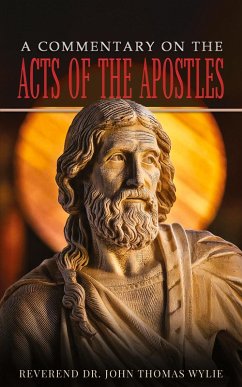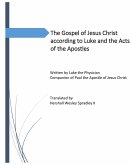In the publication The Acts of the Apostles, Luke wrote to assure Theophilus of "the certainty of those things, wherein thou hast been instructed" (Lk. 1:4). Theophilus was likely a Gentile convert to Christianity, and Luke aimed to provide him with a deeper understanding of Christian origins than he previously had. This included the story of Jesus' life, death, resurrection, and the establishment and expansion of the church.Strictly speaking, Luke did not write a comprehensive history of the early church. This isn't to suggest his narrative is unhistorical or inaccurate. However, a historian's role is to provide a complete account of all significant facts, which Luke did not attempt. For example, he says nothing about the churches in Galilee (Acts 9:31), or the evangelization of Egypt and Rome. His account isn't about all the apostles either-only Peter, James, and John are mentioned, and the latter two only briefly. In reality, the book of Acts focuses on the acts of Peter and Paul.Moreover, Peter is almost entirely absent from the narrative after Cornelius' conversion, leaving us to wonder what became of him. Luke also provides no explanation of the rise of church elders (11:30), how James came to lead the Jerusalem church (15:13), or what Paul did in Tarsus after his conversion (9:30; 11:25). He glosses over some events in a few words (18:19-23), while others are described in detail (21:17-26:32). Essentially, Luke isn't writing a "history" but telling a story. His story outlines the church's growth from Jerusalem to Rome through Samaria, Antioch, Asia, and Europe, with Peter and Paul as the key figures. The ministry of other apostles elsewhere is not relevant to Luke's narrative.Two themes drive the story of the church's expansion: the Jews' rejection of the Gospel and the Gentiles' acceptance of it, as well as how the early church was treated by local and Roman authorities. Luke's purpose in his two-volume work (Luke-Acts) is to explain to Theophilus how the Gospel, which began with the promise of Israel's kingdom restoration (Lk 1:32, 33), ended with the Gentile church in Rome, distinct from Judaism.Judaism was a religion recognized by Rome, and the new Christian fellowship, though it emerged from Judaism, gained similar recognition. Consequently, Christianity became established as a legitimate religion in the Roman world, distinct from Judaism.The book of Acts concludes with the statement that the salvation of God is now sent to the Gentiles, who will listen. The last eight chapters, covering over a quarter of the book, detail Paul's experiences in Jerusalem and his journey to Rome. This raises the question: Why did Luke devote so much space to these events when he summarized equally important ones in just a few words? The answer lies in one of Luke's main purposes: to show that just as the Jewish nation rejected Jesus as Messiah and sent him to the cross, the Jewish leaders in Jerusalem and Rome confirmed their apostasy by rejecting Paul and his gospel.
Bitte wählen Sie Ihr Anliegen aus.
Rechnungen
Retourenschein anfordern
Bestellstatus
Storno


![The Teachers' Commentary on the Acts of the Apostles [microform] The Teachers' Commentary on the Acts of the Apostles [microform]](https://bilder.buecher.de/produkte/65/65494/65494131m.jpg)




![Antichrist in the First Century, or, The Man of Sin Discovered in the Acts of the Apostles [microform] Antichrist in the First Century, or, The Man of Sin Discovered in the Acts of the Apostles [microform]](https://bilder.buecher.de/produkte/66/66184/66184892m.jpg)
